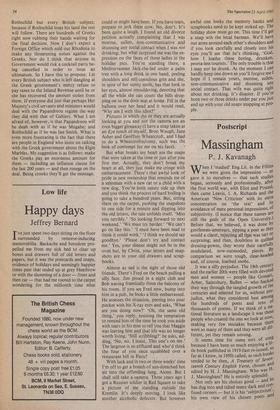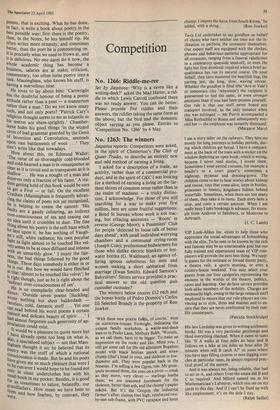Postscript
Massingham,
P. J. Kavanagh
When I 'studied' Eng.Lit. in the Fifties we were given the impression — or gave it to ourselves — that such studies began, seriously and professionally, after the first world war, with Eliot and Pound; then came Leavis, I. A. Richards and the American 'New Criticism' with its stern concentration on 'the text' and itS avoidance of mere personal impressions, of subjectivity. (I notice that these names are still the gods of the Open University.) Before that, we believed, it was done by gentleman-amateurs, sipping a poet as they would a claret, rejecting all that was tart or surprising; and then, doubtless in quilted dressing-gowns, they wrote their carefully modulated, now-outmoded, pieces. BY comparison we were tough, clear-headed and, of course, loathed snobs. It was a silly prejudice. The 19th century and the earlier 20th were filled with devoted men and women — people like Grosart, Arber, Saintsbury, Bullen — who hacked their way through the tangled growth of the centuries and selected for us, without pre- judice, what they considered best among the hundreds of poets and tens of thousands of poems. If we think of a na- tional literature as a landscape it was these people who created the one we look at now, making very few mistakes because there were so many of them and they were all dif- ferent, yet they remain unsung. It seems time for some sort of song because I have been so much enjoying a lit- tle book published in 1919 (last re-issued, SO far as I know, in 1950) called, as such books tended to be then, A Treasury of Seven-, teenth Century English Verse, chosen and edited by H. J. Massingham. Who was H- i. Massingham? He is entirely splendid- Not only are his choices good — and he has dug into and tidied many dark and con- fused corners — but it is his `subjectivism' his own view of his chosen poets and poems, that is exciting. What he has done, in fact, is write a book about poetry in the best possible way: first there is the poetry, then, in the Notes, he lets himself rip. He often writes more ornately, and sometimes better, than the poet he is commenting on. It is precisely what we used to frown at, and it is delicious. No one dares do it now, the whole academic thing has become a business, salaries are at stake; criticism, commentary, too often turns poetry into a task. Massingham, who knows his stuff, is having a marvellous time.
He loves to lay about him: 'Cartwright has the doubtful honour of being a poetic attitude rather than a poet — a mannerism rather than a man.' Do we not know many such, and not only poets? 'Patrick Cary 's religious thought seems to me as infantile as his metres are sham-sprightly.' Chamber- laYne hides his good things 'in the wizard
.. caves of bad grammar guarded by the Genii of Inversion and Convolution, sentinels upon vast battlements of wool ...' They don't write like that nowadays.
How about this, on Edmund Waller: The verse of so thoroughly cold-blooded and cold-hearted a man is in consequence as Clear as it is trivial and as transparent as it is shallow • .. He was a nought of a man and deserves only a fraction of his fame.' A stu- dent getting hold of this book would be sure to get a First — or fail. On the excellent Crashaw (Massingham is frequently advan- cing the claims of poets not yet recognised, he Is helping to create the canon): 'His faults are a gaudy colouring, an indirect over-consciousness of sex and teasing out an idea until it crumbles to dust. The fine thing about his poetry is the soft haze which he lays upon it. he has nothing of Vaugh- an s still, white radiance; his own peculiar light (a light almost to be touched like vel- vet) seems to be at once diffused and intense with an unearthly glow.' I enjoy the fair- ness, the bad things followed by the good .things. These days somebody is either in or he is out. But how we would have flinched at that 'almost to be touched like velvet'; he is right though, just as he is right about the indirect over-consciousness of sex'.
He is so exemplarily clear-headed and uireet, 'Outside seven poems [Suckling] wrote nothing but sheer balderdash
tasteless, cold, fantastic stuff ... Yet one can read behind his worst poems a certain ,naivete and delicate beauty of spirit ... ' I 'lad al most forgotten such generosity of ap- preciation could exist.
It would be a pleasure to quote more but I
have already spent too long on what is, ; was, a specialised subject — not that Mass- '11811am thought it so; he believed that its poetry was the stuff of which a national consciousness is made. But he and his poets have given me so much pleasure that were I to be run over I would hope to be found not o nlY In clean underclothes but with his
all book in my pocket. Besides, it is good tor us sometimes to salute, belatedly, our kreandfathers. How mean we have been to In and how fearless, by contrast, they were,











































 Previous page
Previous page